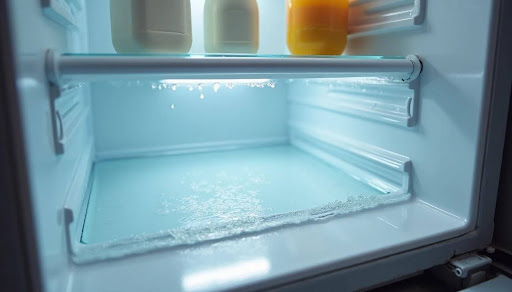Finding a puddle of water around your refrigerator isn’t just annoying – it’s a warning sign that something’s gone wrong with one of your home’s most essential appliances. So why exactly is your fridge leaking water, and what can you do about it before facing costly repairs or food spoilage?
Based on our experience servicing thousands of refrigerators across the Vancouver area at Barton Appliance Repair, water leaks rank among the most common yet potentially serious refrigerator problems homeowners face. According to FDA food safety guidelines, your refrigerator must maintain temperatures at or below 40 degrees Fahrenheit – something a leaking unit often struggles to achieve. Below some simple tips can help you.
Why Is My Fridge Leaking Water Inside?
Blocked defrost drain
This tops our repair list every month. The small drain hole at the back of your freezer allows defrost water to flow into a collection pan underneath your fridge. Food particles, ice chunks, and debris frequently clog this passage, causing water to back up and pool inside. Once enough water accumulates, it leaks through the bottom seal and creates puddles on your floor.
How to check
Look for the small drain hole in your freezer (usually at the back wall). If you see ice or debris around it, you’ve likely found your problem.
Water supply line issues
If you have an ice maker or water dispenser, the water supply line might be damaged, kinked, or improperly connected. Our technicians frequently find that loose connections or poor installation are responsible for persistent leaks.
Door gasket failures
Your refrigerator’s door seal (gasket) keeps cold air in and warm air out. When this seal gets dirty, torn, or worn out, warm air enters and creates condensation that eventually forms water droplets.
Quick test
Close your refrigerator door on a dollar bill – if you can pull it out easily without resistance, your gasket needs cleaning or replacement.
Humidity problems
During Vancouver’s humid summer months, moisture rushes into your refrigerator each time you open the door. This excess moisture condenses on cold surfaces and eventually overwhelms the drain system.
Unlevel refrigerator
Your fridge needs to be slightly tilted backward to direct water toward the drain channels. When improperly leveled, water collects in areas without drainage paths.
Filter and valve issues
Improperly installed water filters or internal valve connections can drip steadily inside your unit. If your water dispenser drips continuously, check your filter installation and connections.
Most interior refrigerator leaks have straightforward fixes that don’t require expensive parts or specialized tools. However, if water continues to appear after addressing these common causes, you might be dealing with a more complex issue that needs professional attention.
When to Call a Professional
Let’s face facts, not all refrigerator leaks can be fixed with DIY solutions. Our technicians at Barton Appliance Repair have seen countless situations where homeowners made problems worse by attempting repairs beyond their skill level. Knowing exactly when to call in an expert saves you time, money, and potentially dangerous situations.
Warning Signs That Require Professional Help:
After trying the basic troubleshooting steps we’ve outlined, you should pick up the phone and call a qualified technician when:
- You’ve cleared drains and checked seals, but water keeps appearing
- There’s a burning smell coming from any part of the refrigerator
- Your electricity bills have suddenly jumped without explanation
- Strange noises or vibrations have developed
- Food isn’t staying as cold as it should (above 40°F)
Emergency Situations – Call Immediately:
If your fridge is leaking a colored fluid with a chemical smell, stop what you’re doing and call a professional right away. This is likely coolant (refrigerant), which is toxic and requires proper containment and disposal.
According to the Canadian Appliance Service Association, diagnostic fees typically range from CAD 69.67 to CAD 209.00. Most repair companies waive this fee if you proceed with their repairs – consider it an investment in accurate diagnosis rather than an extra expense.
FAQs
Q1. Why is my refrigerator leaking water inside?
A1. The most common cause is a blocked defrost drain. Food particles, ice, or debris can clog this drain, causing water to back up and pool inside the refrigerator. Other potential causes include a damaged door seal, excessive humidity, or an unlevel refrigerator.
Q2. How can I stop my fridge from leaking water?
A2. Start by locating the drain tube at the back or bottom of the fridge-freezer and gently clear any obstructions using a pipe cleaner or small brush. Also, check the drain pan underneath for proper placement. Ensure the refrigerator is level and the door seal is clean and undamaged.
Q3. When should I call a professional for a leaking refrigerator?
A3. Call a professional if the leak persists after attempting basic troubleshooting, if you notice unusual noises or smells, if your electricity bills have increased significantly, or if the refrigerator isn’t maintaining proper temperature. Also, seek immediate professional help if you suspect a coolant leak.
Q4. Can a clogged defrost drain cause other issues besides leaks?
A4. Yes, a clogged defrost drain can affect your refrigerator’s efficiency over time. It can lead to ice buildup, improper temperature regulation, and potentially shorten the appliance’s lifespan by causing rust or interfering with fan operation.
Q5. How often should I perform maintenance on my refrigerator to prevent leaks?
A5. Regular maintenance is key to preventing leaks. Clean the door gaskets, check drain holes, and ensure proper leveling every few months. It’s also advisable to schedule occasional professional maintenance checks to catch potential issues early and avoid unexpected leaks or breakdowns.

